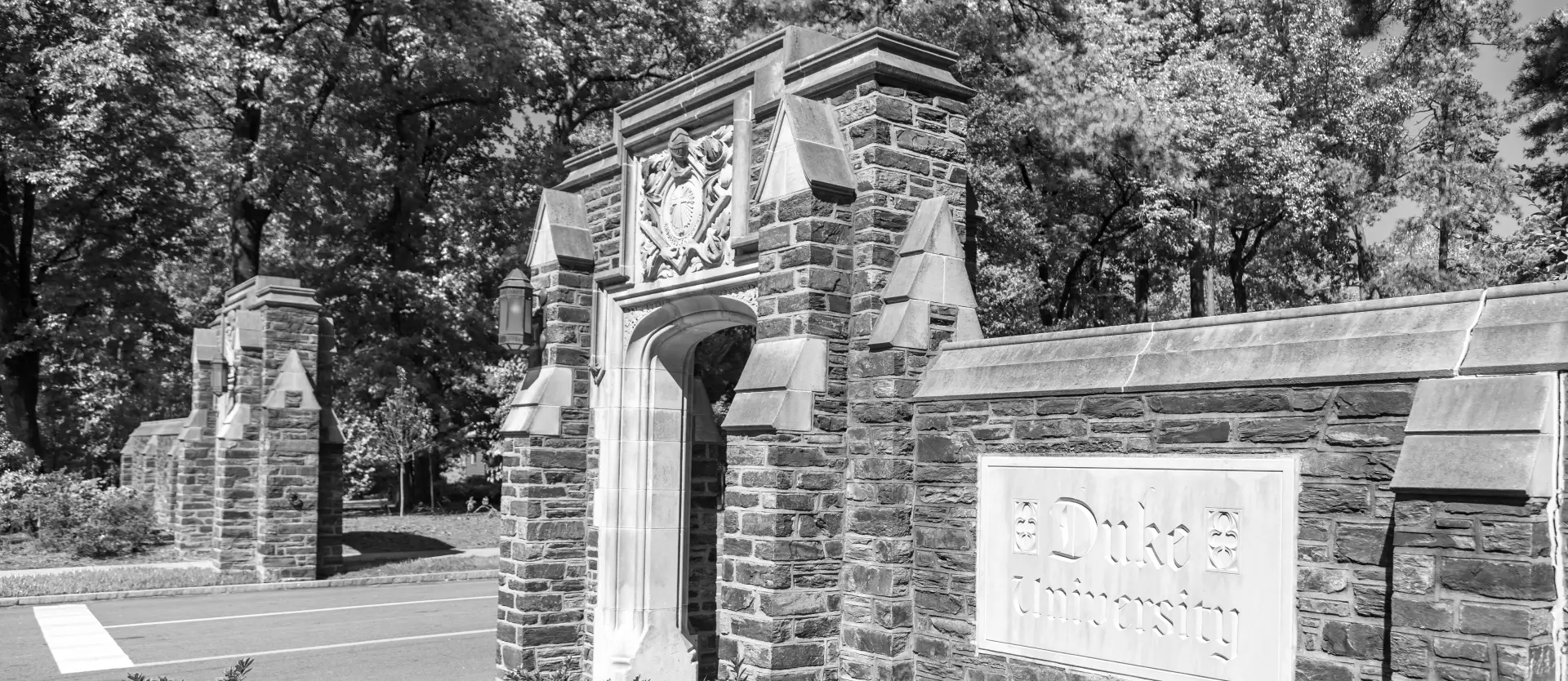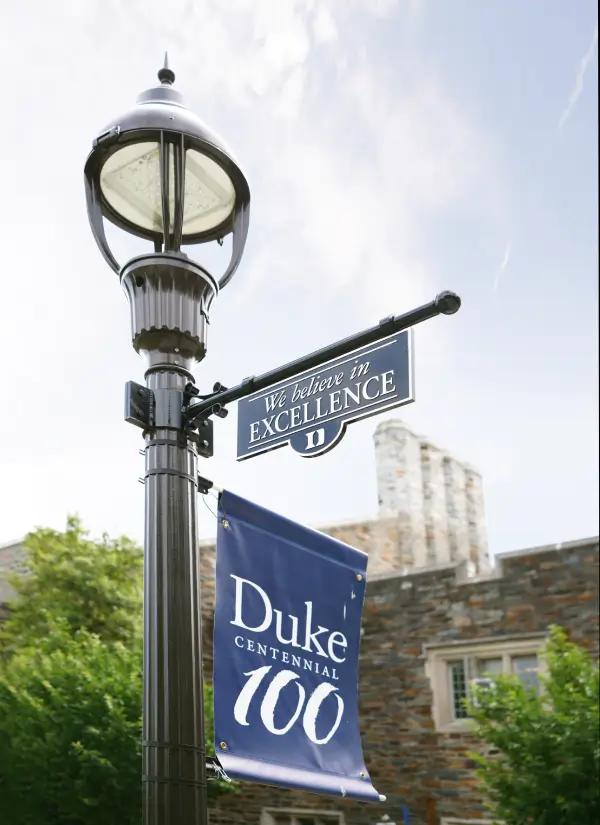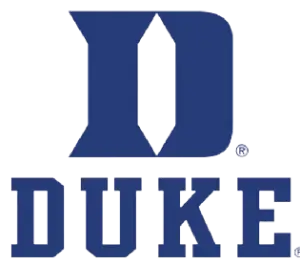
Duke University
Duke University is a private research university located in Durham, North Carolina. It was originally founded in 1838 by Methodists and Quakers in what is now the town of Trinity, and relocated to Durham in 1892. In 1924, the institution was renamed in honor of Washington Duke, following the establishment of the Duke Endowment by his son, James Buchanan Duke, a notable figure in the tobacco and electric power industries. Georgian-style buildings and houses all first-year students.
Duke has a global academic footprint, operating two international schools: Duke–NUS Medical School in Singapore, founded in 2005, and Duke Kunshan University in China, established in 2013. It is also a key member of North Carolina’s Research Triangle, alongside North Carolina State University and the University of North Carolina at Chapel Hill. In 2019, Duke invested more than $1.2 billion in research, and its endowment is valued at approximately $11.9 billion, placing it among the top private academic institutions in the United States.
Duke’s athletic teams, known as the Blue Devils, compete in 27 NCAA Division I sports as part of the Atlantic Coast Conference. The university has earned 17 NCAA team championships, with its men’s basketball team recognized as one of the most successful programs in collegiate sports.
2025 Rankings
by U.S. News & World Report
by QS World University Rankings
by Times Higher Education
Undergraduate Admissions Process Summary
Application Deadlines
Early Decision: November 1
Regular Decision: January 2
Application Portal
Common Application
Coalition Application
QuestBridge Application
Standardized Tests
Optional
Recommendation Letters
Counselor Recommendation: 1 Letter
Teacher Recommendation: 2 Letters
On Campus Residence for Freshmen
Required
International Students
English Proficiency
TOEFL: minimum score 100
IELTS: minimum score 7.0
Duolingo: minimum score 120
Interview
Not required
Offered Alumni Conversations
University Specific Requests
None
Application Fee
$85
-
Computer Science 17%
-
Economics 9%
-
Biology 9%
-
Public Policy Analysis 8%
-
Psychology 5%
-
Political Science 4%
Popular
Majors
4.1%
Acceptance Rate
3,982 of Faculty Members
126 nations represented
54% of Duke undergraduates study abroad;

Total Students
-
White: 52%
-
Asian: 29%
-
Hispanic: 9%
-
Black: 8%
-
Native American: 1%
Campus
Duke University’s campus spans over 8,600 acres and is renowned for its harmonious blend of historical and modern architecture. The campus is divided into three main areas: West Campus, East Campus, and Central Campus, each with its own distinct character.
West Campus is celebrated for its Collegiate Gothic architecture, a vision brought to life in the 1920s by African American architect Julian Abele. The centerpiece is the iconic Duke Chapel, a 210-foot structure that stands as a symbol of the university’s rich heritage. The surrounding buildings, with their intricate stonework and towering spires, contribute to the campus’s moniker, the “Gothic Wonderland.”
In contrast, East Campus features Georgian-style architecture and serves as the residential area for all first-year students.This design fosters a close-knit community atmosphere, easing students’ transition into university life. The red-brick buildings and tree-lined pathways offer a warm and inviting environment that complements the grandeur of West Campus.
Central Campus acts as a bridge between the East and West, housing various academic and residential facilities. The university’s commitment to integrating modern design with its historical roots is evident here, as contemporary structures coexist with traditional styles, reflecting Duke’s forward-thinking approach to education and campus development.
Beyond its architectural beauty, Duke’s campus is enveloped by the expansive Duke Forest, covering over 7,000 acres.This natural sanctuary serves as an outdoor laboratory for research and provides a serene backdrop for recreation and reflection. Additionally, the Sarah P. Duke Gardens, a 55-acre public botanical garden, offers meticulously curated landscapes and is a testament to the university’s dedication to environmental stewardship.
Cost of Attendance
-
Tuition $66,326
-
Estimated Fees $2,814
-
Housing $10,254
-
Food $9,544
-
FoodBooks, Course Materials, Supplies $536
-
Miscellaneous Personal Expenses $3,274
-
Transportation (domestic) $582
-
Total $93,330
At Duke, 13% of undergraduates qualified for the Pell Grant
Notable Affiliations
Duke University boasts an impressive roster of alumni who have made significant contributions across science, business, politics, sports, and the entertainment world.
In science and medicine, one of Duke’s most notable alumni is Dr. Francis Collins, former director of the National Institutes of Health and leader of the Human Genome Project. Another prominent figure is Dr. Paul Farmer, a physician and anthropologist known for his global health work and co-founding Partners In Health.
In business, Duke has produced several Fortune 500 executives and entrepreneurs. Melinda French Gates, co-chair of the Bill & Melinda Gates Foundation and a former Microsoft executive, earned both her undergraduate and MBA degrees at Duke. Tim Cook, Apple’s CEO, received his MBA from Duke’s Fuqua School of Business. Additionally, Randall Stephenson, former CEO of AT&T, is also a Duke alum.
In politics and public service, Duke alumni have served in high-profile roles in government and international affairs. Richard Nixon, the 37th President of the United States, graduated from Duke Law School. Other notable political figures include Elizabeth Dole, a former U.S. senator and cabinet member under two presidents, and Ron Klain, who served as White House Chief of Staff to President Joe Biden.
Duke’s reputation for athletic excellence is matched by its roster of sports legends, especially in basketball. Grant Hill, Kyrie Irving, Zion Williamson, and Christian Laettner are just a few of the NBA stars who launched their careers under Coach Mike Krzyzewski at Duke. In tennis, Althea Gibson, the first African American to win a Grand Slam title, also has ties to Duke through her honorary degree and close association with the university.
In the world of entertainment and media, Duke alumni have made their names as actors, writers, and journalists. Ken Jeong, comedian and actor known for roles in The Hangover and Community, earned his undergraduate degree at Duke before attending medical school. Randall Wallace, screenwriter of Braveheart, and Judy Woodruff, longtime anchor of PBS NewsHour, are also proud Duke graduates.

Duke is known for its top-tier programs in biomedical engineering, public policy, economics, law, medicine, and business. It also has a world-renowned medical center and is celebrated for its elite basketball program.
That would be Duke Chapel, the 210-foot Gothic structure at the heart of West Campus. Its towering spires and stained-glass windows give major Hogwarts vibes and make it one of the most iconic university chapels in the country.
No, Duke is not an Ivy League school, but it is often considered one of the top “Ivy Plus” institutions due to its academic rigor and prestige.
“Krzyzewskiville” (pronounced Sha-shef-ski-ville) is the name of the tent city students set up outside Cameron Indoor Stadium to score front-row seats to men’s basketball games. It’s named after legendary coach Mike Krzyzewski, and camping out there has become a rite of passage for Duke students.
As of now, Duke is test-optional, meaning applicants can choose whether or not to submit SAT or ACT scores. This policy is currently in place for the 2025–2026 admissions cycle.
Absolutely. Duke offers an interdisciplinary certificate called Markets and Management Studies, which is like a mini-business program often paired with majors in economics, public policy, or even visual arts.
Yes! Duke is home to the Duke Lemur Center, the largest sanctuary for endangered lemurs outside of Madagascar. Students and researchers study these playful primates in a one-of-a-kind environment that blends conservation and science.
Student life at Duke is vibrant and well-rounded, with over 400 student organizations, strong Greek life, a commitment to service, and a deep sense of school spirit, especially around athletics and campus traditions like the annual Krzyzewskiville campout before basketball games.
Yes! It’s called the “Midnight Run” and it happens during finals week. Students streak through the Perkins Library to blow off steam and bring some comic relief during a stressful time.
They do—and they earn the name. Duke basketball fans are famously intense and creative, dressing up in wild costumes, painting their faces blue, and choreographing cheers to psych out the competition. The energy inside Cameron Indoor Stadium is legendary.

